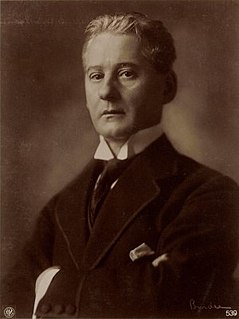UFA GmbH, shortened to UFA, is a film and television production company that unites all production activities of the media conglomerate Bertelsmann in Germany. Its name derives from Universum-Film Aktiengesellschaft, a major German film company headquartered in Babelsberg, producing and distributing motion pictures from 1917 until the end of the Nazi era. The name UFA was revived by Bertelsmann for an otherwise unrelated film and television outfit, UFA GmbH.

Erich Pommer was a German-born film producer and executive. Pommer was perhaps the most powerful person in the German and European Film Industries in the 1920s and early 1930s.

Paul Biensfeldt was a German-Jewish stage and film actor.
Lydia Potechina was a Russian actress. She emigrated to Germany in 1918. She was married to the Russian-German film producer Max Pfeiffer.

Hans Mierendorff was a German stage and film actor.
Rudolf Meinert was an Austrian screenwriter, film producer and director.

Heinrich Felix Erich Kaiser-Titz was a German stage and film actor.
Sophie Berg Pagay was an Austrian stage and film actress, born in Brünn, Austria-Hungary. She began acting as a child, and went to Berlin to perform on stage in 1887. She married actor Hans Pagay.

Melody of the Heart is a 1929 German musical film directed by Hanns Schwarz and starring Dita Parlo, Willy Fritsch and Gerő Mály.
Hermann Picha was a German stage and film actor. Picha was extremely prolific, appearing in over 300 short and feature films during the silent and early sound eras. Picha played a mixture of lead and supporting roles during his career. He played the title role in the 1920 film Wibbel the Tailor, directed by Manfred Noa. He appeared in Fritz Lang's Destiny.
Erich Czerwonski (1889–1940) was a German art director. He designed the sets for around a hundred productions during his career. He died in 1940 after being struck by a train during a blackout.
Phoebus Film or Phoebus-Film was a German film production and distribution company active during the silent era. It was one of the medium-sized firms established during the early boom years of the Weimar Republic. It had a distribution agreement with the American studio MGM.
Hermann Gotthilf Ferdinand Boettcher was a German stage and film actor.
Hugo Döblin was a German stage and film actor. He appeared in more than eighty films, most of them during the silent era. The Jewish Döblin left Germany following the Nazi Party's rise to power in 1933, and after moving first to Czechoslovakia and Austria, eventually settled in Switzerland. His younger brother was novelist, essayist, and doctor Alfred Döblin (1878–1957).
Gerhard Ritterband (1904–1959) was a German film actor.

Aafa Film or Aafa-Film was a German film production and distribution company which operated during the 1920s and 1930s. Established in 1920 as Radio-Film the company was controlled by the producer Gabriel Levy and the director Rudolf Dworsky. The company was one of the leading producers of the Weimar Republic, and survived the transition from silent to sound film in 1929. It made the first German full sound film It's You I Have Loved that year. During the early 1930s Aafa produced a number of mountain films directed by Arnold Fanck. It also made a multi-language version musical Lieutenant, Were You Once a Hussar? (1930).

The Weissensee Studios was a collection of separate film production studios located in the Berlin suburb of Weißensee during the silent era.
Decla-Film was a German film production and distribution company of the silent era, founded by Erich Pommer and Fritz Holz in February 1915.
Albert Pommer was a German film producer. He was the elder brother of Erich Pommer, the head of the leading German studio UFA during the 1920s. Albert worked on a number of films distributed by UFA. He had earlier been appointed by his brother an executive of the newly formed Decla Film in 1915.
Ernst Johann Pröckl was an Austrian stage actor and director. He also appeared in numerous films, mainly German.






